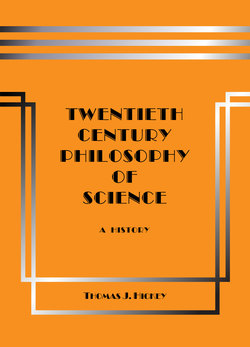Читать книгу Twentieth-Century Philosophy of Science: A History (Third Edition) - Thomas J. Hickey - Страница 67
На сайте Литреса книга снята с продажи.
3.36 Metaphysical and Scientific Realism
ОглавлениеMetaphysical realism is the thesis that there exists mind-independent reality, which is accessible to and accessed by human cognition.
In the section titled “Is There Any Justification for External Realism” in his Mind, Language and Society: Philosophy in the Real World University of California realist philosopher John R. Searle refers to metaphysical realism as “external realism”, by which he means that the world exists independently of our representations of it. He says that realism does not say how things are, but only that there is a way that they are. Thus the way that they are would include Heisenberg’s “potentia” as the quantum theory describes reality with its indeterminacy relations and duality thesis. The theory describes microphysical reality as being that certain way and not otherwise, such that the theory is testable and falsifiable.
Searle denies that realism can be justified, because any attempt at justification presupposes what it attempts to justify. In other words all arguments for metaphysical realism are circular, because realism must firstly be accepted. Any attempt to find out about the real world at all presupposes that there is a way that things are. He goes on to affirm the picture of science as giving us objective knowledge of an independently existing reality, and that this picture is taken for granted in the sciences.
Similarly in “Scope and Language of Science” in Ways of Paradox Harvard University realist philosopher Willard van Quine writes that we cannot significantly question the reality of the external world or deny that there is evidence of external objects in the testimony of our senses, because to do so is to dissociate the terms “reality” and “evidence” from the very application that originally did most to invest these terms with whatever intelligibility they may have for us. And to emphasize the primal origin of realism Quine writes that we imbibe this primordial awareness “with our mother’s milk”. He thus affirms what he calls his “unregenerate realism”. These statements by Searle, Quine and others of their ilk are not logical arguments or inferences; they are affirmations.
Hickey joins these contemporary realist philosophers. He maintains that metaphysical realism, the thesis that there exists mind-independent reality accessible to and accessed by cognition, is the “primal prejudice” that can only be affirmed or denied. And he affirms that it is a correct and universal prejudice, even though there are delusional psychotics and sophistic academics that are in denial. Contrary to Descartes and latter-day rationalists, metaphysical realism is neither a conclusion nor an inference nor an extrapolation. It cannot be proved logically, established by philosophy or science, validated or justified in any discursive manner including figures of speech such as analogy or metaphor. Hickey regards misguided pedantics who say otherwise as “closet Cartesians”, because they never admit they are neo-Cartesians. The imposing, intruding, recalcitrant, obdurate otherness of mind-independent reality is immediately self-evident at the dawn of consciousness; it is a most rudimentary experience. Dogs and cats are infra-articulate and nonreflective realists. To dispute realism is to step through the looking glass into Alice’s labyrinth of logomanchy, of metaphysical jabberwocky where, as Schopenhauer believed, the world is a dream. It is to indulge in the philosophers’ hallucinatory narcotic.
Scientific realism is the thesis that a tested and currently nonfalsified theory offers the most empirically adequate and thus most realistic description of reality at the current time.
After stating that the notion of reality independent of language is in our earliest impressions, Quine adds that it is then carried over into science as a matter of course. He writes that realism is the robust state of mind of the scientist, who has never felt any qualms beyond the negotiable uncertainties internal to his science.
Note that contrary to Feyerabend the phrase “scientific realism” does not mean scientism, the thesis that only science describes reality.
